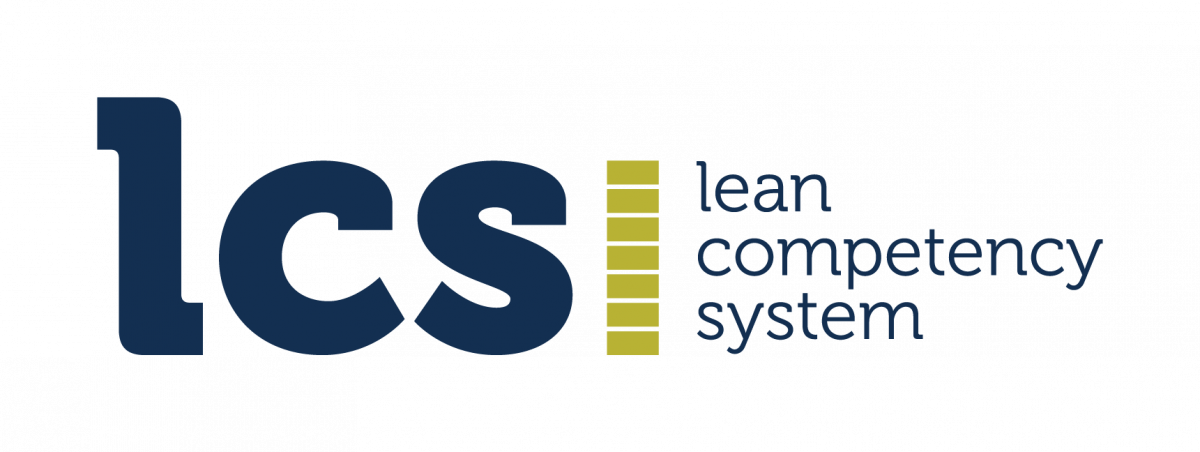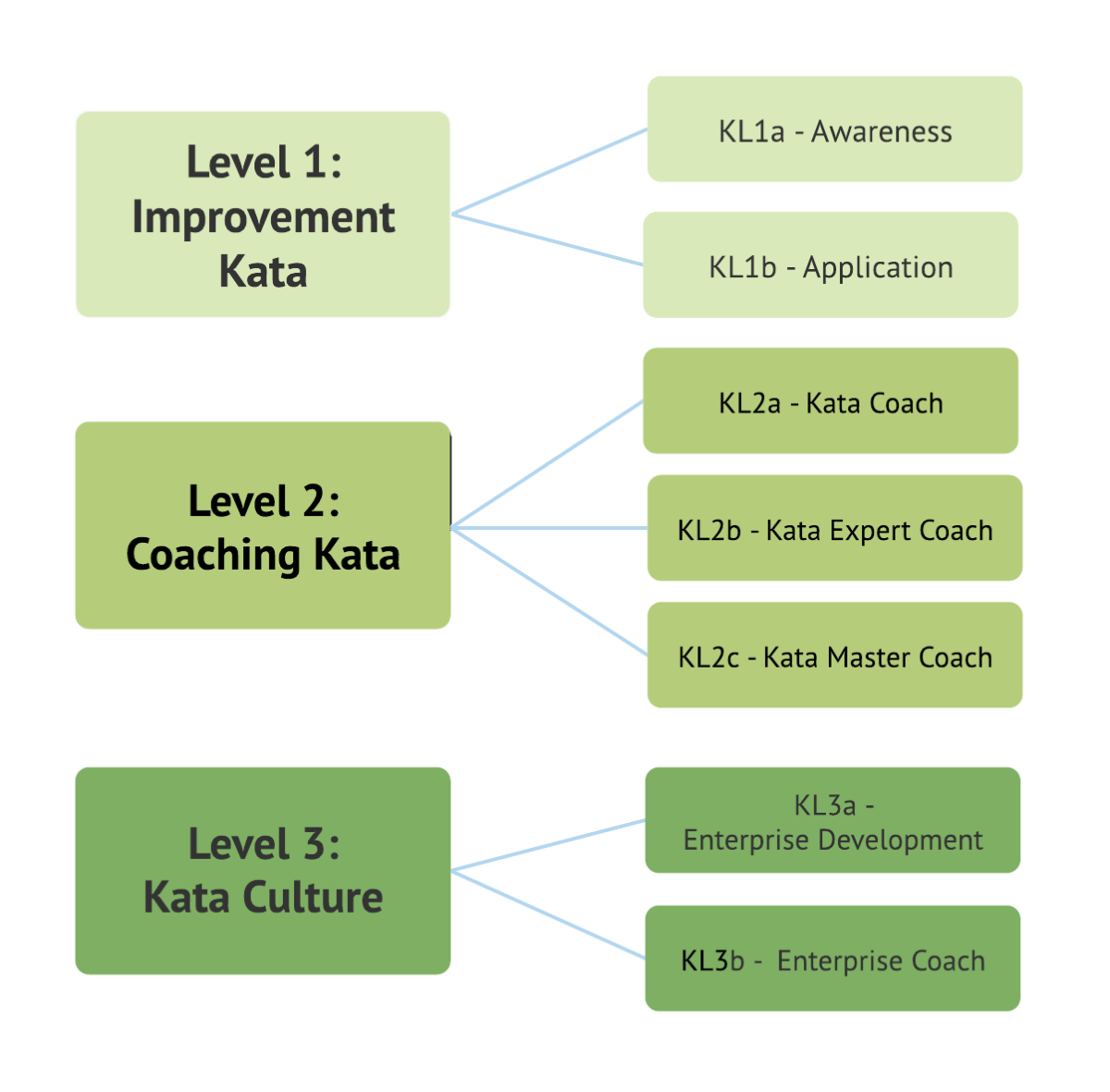Industry standard kata qualifications, developed by the LCS
Welcome to the Kata Competency System website
The Kata Competency System (KCS) is a kata qualification framework used by accredited organisations to support kata training programmes and by employees and continuous improvement practitioners as a vehicle to develop kata knowledge and practical skills.
There are seven levels in the KCS framework, grouped into three categories 1) Improvement Kata, 2) Coaching Kata and 3) Kata Culture, covering the entire spectrum of kata knowledge and practice.
The KCS is managed by Lean Competency Services Ltd, which holds the Cardiff University licence to manage and operate the Lean Competency System as associated products.
 |
 |
Attend an Introduction to the KCS webinar by clicking the link below,

Core proposition
An organisation can become accredited making it an Accredited Certifier of Kata Competency, allowing it to issue Certificates of Kata Competency to those it trains. The accredited organisation could be a company or public service body training its own staff, or a consultant providing kata programmes for its clients’ staff.
Organisations
The KCS offers a solution for an organisation that wants its kata training accredited and endorsed, staff to be rewarded and recognised for their knowledge, capability and commitment, reassurance that its kata training is robust, technically sound & well managed and a flexible, university linked, kata qualification framework that offers a universal standard.
Individuals
The KCS offers individuals a framework for competency growth and professional development, recognition of their kata competency, a kata qualification with high perceived value and access to a network of CI professionals for ongoing learning.
Note that experienced kata practitioners can be certified at KCS Level 2 via the Approved Prior Learning & Experience route. This involves providing evidence of coaching capability gained in employment roles with organisations and consultancies.
Vision, Ethos & the Kata Code
KCS guiding principles and underpinning philosophy are encapsulated in its Vision, Ethos and the Kata Code
KCS Vision
- To support individuals, teams, and organisations in effectively practicing Toyota Kata for developing practical scientific-thinking skills to increase adaptiveness and creativity.
- The KCS creates, delivers and continually improves a world standard, premium qualification framework that supports organisations and individuals in effectively practicing and teaching Toyota Kata.
- The KCS helps trainers to design and improve their Toyota Kata training approaches and programmes to achieve highest levels of quality and effectiveness.
- The KCS provides practitioners with the confidence that the accredited programmes are ‘quality assured’ to the most rigorous of standards.
KCS Ethos
- We are all learning and the KCS will evolve to ensure it continues to meet its vision, through experimentation, learning, and feedback from the Toyota Kata community.
- We believe that deliberate practice is at the core of successful habit change and development of shared mental frameworks in an organisation. Thus any Toyota Kata learning journey should focus on regular and deliberate practise with a coach.
- To be a coach, you should practice Improvement Kata first.
- Organisations and individuals should develop their own way over time, but should practice the Starter Kata first.
Any content presented and shared under the KCS follows the spirit of The Kata Code.
The Kata Code
- Conditions are unpredictable.
- Enjoy the learning zone.
- Understand the direction, grasp the current condition, establish a target condition, experiment toward the target condition.
- Beginners practice Starter Kata exactly.
- Have a coach, be a coach.
The benefits of KCS accreditation
The KCS provides a range of benefits for accredited organisations.
Consultants
A consultant with a kata training capability can become an Accredited Certifier of Kata Competency enabling it to issue KCS Certificates of Kata Competency to learners who progress through its training. It’s a valuable addition to the consultant’s service, as building its client’s staff kata capability is critical in the journey to developing a sustainable CI culture.
- Added value to your core offering, improving margins and competitive advantage.
- Meets the need for accredited training and qualifications with high perceived value.
- Independent endorsement of your kata training credentials.
- A framework around which kata programmes and training courses can be developed.
- A focus on practice that improves training effectiveness.
- Career progression and professional development for practitioners.
- Linkage to the LCS and Lean Enterprise Research Centre networks.
Organisations
An organisation can become KCS accredited when it has demonstrated that it has a technically robust, well organised, effectively managed, professionally delivered training programme that is aligned to the KCS qualifications framework. Accreditation also signifies a commitment to high standards and continuous improvement.
- Motivates employees to engage in continuous improvement.
- Accreditation improves the design, integration and professionalism of training.
- External endorsement from an established CI authority.
- KCS qualifications helps promote employees’ professional development.
- Links training with practical application, directly benefiting business performance.
- A standard that you can apply throughout the organisation.
- KCS certification rewards and recognises employee effort and achievement.
Frequently asked questions
View all FAQsWhat is the underpinning philosophy of the KCS framework?
What type of organisations can become accredited?
Do I need to progress through each KCS level as I build my capability?
Useful resources
Check out these kata resources
Kata history
Where does kata come from and how has it developed? How does it fit with general improvement approaches?
Learn moreThe Improvement kata
In Toyota Kata, Rother outlined a scientific approach to problem solving as a four step model termed the “Improvement Kata.”
Learn moreCoaching kata
The Coaching Kata is a master-apprentice approach to teaching - the coach gives input on what is being practiced, corrects as they practice, and the learner continues to practice with the new input.
Learn moreQualifications
Discover the seven levels of the KCS framework
About us
Find out who is behind the KCS.
Get in touch
Ask us a question about any aspect of the KCS.
